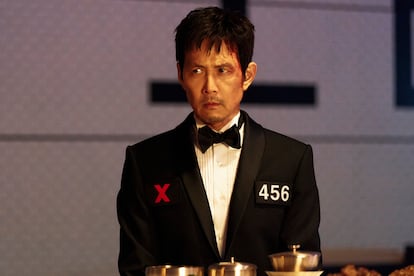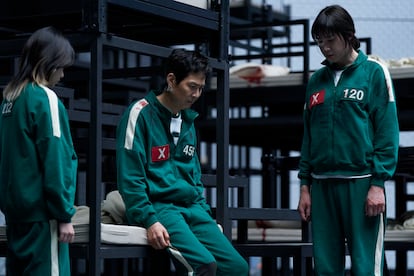Lee Jung-jae, Player 456 of ‘Squid Game’, on its series finale: ‘The fans probably have an ending they want, but this one’s going to be different’
Actor says the last season of Netflix’s most successful production ‘stays very true to its message’

Will Player 456 once again survive the macabre children’s games on a mysterious island played out for a small group of the unscrupulous rich? Will his teammates emerge unscathed, or is everyone doomed? Will the detective find his brother, the mind behind this twisted competition? Answers are on the way. Only six episodes of the third season that premieres on Friday, June 27 stand between us and the end of one of the best and most unexpected television phenomenon in recent years, Squid Game.
Lee Jung-jae, 52, plays Seong Gi-hun, a character better known by the number assigned to him in the game. The actor is aware of the enormous expectations that have grown around the series finale. According to data from Netflix, the show’s first season, which premiered in 2021, was viewed more than 265 million times during its first three months on the platform, a record that stands to this day. That feat is even more impressive considering that the South Korean production took off around the world with little pre-promotion, a true word-of-mouth success. According to more recent data supplied by Netflix to Variety, its first two seasons have now been viewed over 600 million times.
“I know there have been a lot of opinions on the finale of Squid Game because it’s such a successful series,” says Lee when asked for his impressions upon reading the final script. He opts to beat around the bush. “What would be a fitting finale for that? What story or what emotion, what setup would be fitting for a show like this? I bet director Huang Dong-hyuk [who also created the series] pondered very deeply about what would be a fitting ending. And all the viewers and fans probably have an ending that they want from Squid Game, but I’m sure whatever you expect, this one’s gonna be different. I think the finale is quite in line with the message that we are trying to convey — I can tell you for sure that this is a TV show that stays very true to its message,” reflects the protagonist via an English-Korean translator in a videocall interview that took place in mid-June.

The evolution of Player 456 has served as the connective thread of Squid Game. As the third season begin, his morale is beginning to be overtaken by despair — a far cry from the character’s state in the first season, back when he was an ingenue, optimistic about what lay ahead. Characters are now faced with gruesome versions of hide-and-seek, jump rope and other childhood throwbacks, and viewers will say have goodbye to a considerable number of them, as was to be expected.
“The psychological evolution of Gi-hun is something that Director Hwang primarily focused on when creating the show,” says the actor. “It was important for him that viewers could relate to the evolving emotions that Gi-hun experiences, based on the situations he is thrust into. He has had a truly profound character arc. I think he’s the character that experienced the biggest amount of evolution and change, starting from season one, and in season two and three, he experiences events that he did not expect at all. Will he be able to overcome his sense of defeat and continue with the game?”

Lee’s character manages to emerge victorious from the game in the first season, and returns to the competition in an attempt to put an end to it from the inside. Since its premiere, critics have underlined the Korean production’s critique of modern-day capitalism. Does the show’s lead actor have any other interpretations of Squid Game’s theme? “I can’t tell you what the message is, because it’s going to contain spoilers,” he laughs. “I think our show poses questions instead of giving a lecture. Like, is the current capitalist system good for everyone? We try to provide a lot of food for thought, and messages. And among them, I think we also talk about how we can live in harmony with everyone else. How can we make peace? The world economy is struggling right now, but we’re all very much focused on our own interests. Is that the right path forward? I think it’s something worth thinking about.”
The star, who was the first Asian actor to win an Emmy for a leading role, is well-known in South Korea, but Squid Game has led him to enormous international fame. “The biggest difference is that people around the globe now notice me. They look up my filmography and watch my past projects, and they’re curious to learn about what my future project will be,” he says, no longer surprised by the attention. Since the Squid Game boom, he’s acted in the series Star Wars: The Acolyte and directed his first film, Hunt.

Lee is one of many Korean performers experiencing this international moment of their country’s audiovisual industry. He has an explanation for the relatively recent worldwide success of his series and Korean films. “There could be multiple reasons, but I believe one is that we try to pack different factors into a single script. It’s difficult to box our series into one genre, it’s a mixture of comedy, action and social commentary at the same time. We have a lot of genre crossovers here in Korea, and I think that allows viewers of different tastes to relate to the story and find it enjoyable. Instead of trying to pack too much narrative into one thing, we try to pack a wider range of emotions into a film or show,” he says.
Sign up for our weekly newsletter to get more English-language news coverage from EL PAÍS USA Edition
Tu suscripción se está usando en otro dispositivo
¿Quieres añadir otro usuario a tu suscripción?
Si continúas leyendo en este dispositivo, no se podrá leer en el otro.
FlechaTu suscripción se está usando en otro dispositivo y solo puedes acceder a EL PAÍS desde un dispositivo a la vez.
Si quieres compartir tu cuenta, cambia tu suscripción a la modalidad Premium, así podrás añadir otro usuario. Cada uno accederá con su propia cuenta de email, lo que os permitirá personalizar vuestra experiencia en EL PAÍS.
¿Tienes una suscripción de empresa? Accede aquí para contratar más cuentas.
En el caso de no saber quién está usando tu cuenta, te recomendamos cambiar tu contraseña aquí.
Si decides continuar compartiendo tu cuenta, este mensaje se mostrará en tu dispositivo y en el de la otra persona que está usando tu cuenta de forma indefinida, afectando a tu experiencia de lectura. Puedes consultar aquí los términos y condiciones de la suscripción digital.









































